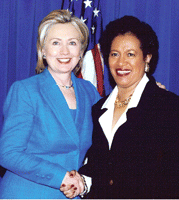Strategically placed in posts across the world are a cadre of psychiatrists who as part of their work have the opportunity to travel extensively, become immersed in different cultures, and occasionally operate within highly charged political environments.
As part of the U.S. Department of State (DOS) Mental Health Program, they lead professional lives that often combine the routine with the extraordinary as they counsel and treat the foreign-service officers and their families stationed overseas.
No one understands this better than Esther Roberts, M.D., the psychiatrist who was tapped to develop the Mental Health Program and became its first psychiatrist director.
Today, there are 22 psychiatrists assigned by the DOS to posts in DOS headquarters in Washington, D.C., and around the world, including London, Moscow, Vienna, New Delhi, Cairo, Nairobi, Beijing, Bangkok, and Lima, among others. Ultimately, the program is responsible for a range of mental health services provided to 37,000 foreign-service officers and their families in 260 consulates and embassies.
Each regional psychiatrist is responsible for the care and treatment of U.S. foreign-service officers and their families within a specific geographic territory that can span countries and cover thousands of miles.
The Mental Health Program also encompasses a domestic component and includes the employee assistance program, which Roberts developed in 1982 for U.S.-based foreign-service officers and civil-service staff, a drug and alcohol awareness program, a deployment stress management program, forensic evaluations, and clinical assessments and services provided for children and adolescents.
In her 28-year career with the DOS, Roberts has worked in South America, Asia, the Middle East, Africa, and Europe. In addition to establishing the program, she served as director of the program from 1980 to 1983 and then again from 1992 to 1997. "It's been a fascinating journey," Roberts told Psychiatric News.
Psychiatrists in the program spend a lot of their time traveling to different embassies within their assigned regions, and the nature of their work can vary greatly, according to Roberts. Clinical duties may include helping State Department employees deal with stress related to their personal and professional lives. The work also includes treating the officers' family members, who may have psychiatric disorders or may be struggling with the stress associated with a sudden evacuation from one community to another, for example.
A shift in the Earth's tectonic plates, a round discharged from an automatic weapon, or a civil uprising has in an instant changed the lives of the foreign-service officers and the psychiatrists' scope of duties. "It can be a dramatic transition from an office-based practice to a situation in which suddenly, you are expected to perform in what can be physically, as well as psychologically, challenging circumstances," she said.
This was the case for Roberts in December 2004 when she was stationed in Cairo and received word that Islamist militants had attacked the U.S. consulate in Jeddah, Saudi Arabia, using explosives and machine guns. Four security guards and five consulate staff died in the attack.
Roberts immediately flew to Jeddah, but not before purchasing an abaya—a long, flowing robe made of black synthetic material and worn there by women in public. "You get a quick cultural lesson when traveling from country to country in these situations," she emphasized.
Once in Jeddah, Roberts counseled consulate employees who had been traumatized by the events of the day using both group and individual therapy sessions. She worked in tandem with another medical officer who tended to the physically injured employees.
Recent world events have also tested the mettle of DOS psychiatrists and affected the mental health of foreign-service officers, Roberts noted, including the political uprising in Cairo and the earthquake and subsequent tsunami and radiation leak in Japan. In these regions, thousands of foreign-service officers and diplomats have been affected by evacuations and other stresses related to these crises.
In some cases, diplomats and foreign-service officers are assigned to "unaccompanied posts" in combat zones such as Iraq or Afghanistan. In these areas, officers function without the presence of their families due to the level of danger in the area. Increasingly, Roberts pointed out, diplomats and foreign-service officers are dealing with posttraumatic stress disorder and other trauma-related mental health problems typically experienced by military troops serving in these regions.
The DOS Office of Medical Services was established in 1947. Physicians and nurses employed by the office treated the foreign-service officers and their families serving abroad and returning to the United States when they required medical care.
When Roberts was asked to develop and direct the Mental Health Program, which falls under the purview of the Office Medical Services, there had been nothing in place to systematically address the mental health needs of all foreign-service officers and their families. At the time, a U.S. ambassador to Afghanistan, Adolph Dubs, had been assassinated by militants. "This was one of the events that solidified the State Department's resolve to attend to the mental health of its personnel," Roberts explained.
She established the program just in time for the release of the 52 U.S. citizens in January 1981, 444 days after they were taken hostage by militants in Iran.
"When the hostages were released," Roberts recalled, "I flew down to Algeria with the medical team to meet them and brought them back to a military base in Wiesbaden, Germany." At that point, Roberts and her colleagues had been studying the mental health effects of captivity but had few examples to reference—prisoners held in Vietnam during the long war there were among the examples available.
President Carter flew to the military base almost immediately to talk to the now-released hostages, which Roberts and colleagues felt would be "too much confrontation too soon," but, she said, discussions with Carter turned out to be "a cathartic release for the hostages who had been angry and thought that nothing was done to secure their freedom."
Roberts recently attended an event marking the 30th anniversary of their release and said she "was heartened to hear some of the former hostages recognize their psychiatrists" for the support they provided immediately after their ordeal.
Events following the hostage situation, such as the bombing of U.S. embassies in Lebanon and El Salvador, provided further learning experiences for Roberts and her psychiatric colleagues in terms of what to expect from people who have experienced trauma and how best to help them.
Nearly 30 years after starting the program, Roberts now serves as a consultant to the Department of State and is a clinical professor of psychiatry at George Washington University, where she leads a seminar to educate psychiatry residents about roles they can play within different organizations, with the State Department being one of them.
Through the seminar, psychiatry residents have the opportunity to participate in videoconferences with regional psychiatrists employed with the DOS's mental health program and to learn in detail about the work they do.
These psychiatrists' offices are housed within the embassies, and they often see and interact with the officers outside of the embassies and within the close-knit diplomatic communities, which raises boundary issues for psychiatrists at times, Roberts noted.
They also may learn about some of the cultural issues that regional psychiatrists encounter in their work abroad. Though their patients are U.S. citizens, the regional psychiatrists may sometimes use local mental health resources to augment the care they can provide, she said.
The fact that regional psychiatrists spend a good part of their time traveling from embassy to embassy appeals to the wanderlust in some who apply for the psychiatric positions. "I think the mantra for the next generation of psychiatrists should be "Have couch—will travel," Roberts remarked.

